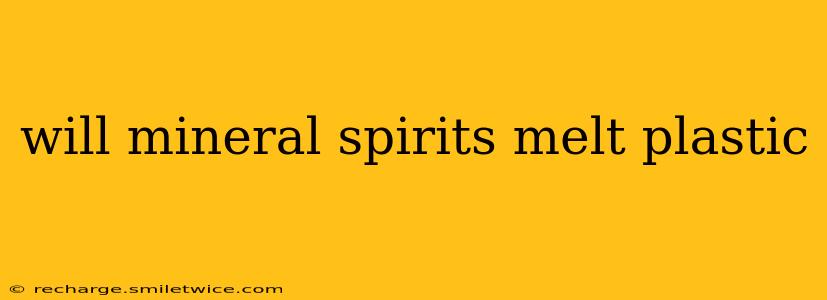Mineral spirits, a common solvent used in cleaning and thinning paints, are often wondered about in relation to their effect on plastics. The short answer is: it depends. Mineral spirits won't melt plastic in the way that, say, a strong acid might dissolve a metal. However, it can soften some plastics, damage others, and have no effect on many more. Understanding which plastics are affected and why is key.
What are Mineral Spirits?
Before diving into their effects on plastics, let's quickly define mineral spirits. These are a mixture of aliphatic and aromatic hydrocarbons derived from petroleum. They're volatile, meaning they readily evaporate, and possess varying degrees of solvent power depending on their specific composition. This is crucial to understanding their interaction with different plastic types.
Which Plastics are Affected by Mineral Spirits?
The impact of mineral spirits hinges on the type of plastic. Plastics are categorized by their resin identification codes (RIC), often found on the base of plastic products as a number within a chasing arrows symbol. Here's a breakdown of how different plastic types generally react:
Plastics that May Be Affected:
- Polystyrene (PS) #6: Styrofoam and some other polystyrene products can be softened or slightly dissolved by prolonged exposure to mineral spirits. This doesn't mean they'll completely melt away, but they could become misshapen or weakened.
- Polypropylene (PP) #5: While generally more resistant, certain formulations of polypropylene might show some minor softening or surface damage with prolonged contact with mineral spirits. This is less common than with polystyrene.
- Acrylonitrile Butadiene Styrene (ABS) #7: ABS plastics, used in many household items, may also exhibit some susceptibility to mineral spirits, though it's usually less pronounced than with polystyrene.
Plastics that are Generally Unaffected:
- Polyethylene (PE) #2 & #4 (HDPE & LDPE): These common plastics used in bottles, bags, and films are generally very resistant to mineral spirits.
- Polyvinyl Chloride (PVC) #3: PVC is also usually unaffected by mineral spirits.
- Polyethylene Terephthalate (PET) #1: PET, used in many beverage bottles, shows high resistance to mineral spirits.
- Polycarbonate (PC) #7: While also labeled #7, polycarbonate is significantly more resistant to solvents than ABS.
Important Note: The specific formulation of a plastic can influence its response. Additives and processing methods can alter a plastic's resistance to solvents.
Will Mineral Spirits Melt Plastic Toys?
This depends entirely on the plastic used in the toy. Many children's toys are made of polyethylene or polypropylene, which are highly resistant. However, some older toys or those made of less common plastics might be susceptible to softening or damage from mineral spirits. It's best to avoid using mineral spirits on toys unless you know for certain the plastic composition and its resistance.
Can Mineral Spirits Damage Plastic Car Parts?
Similar to toys, the impact of mineral spirits on plastic car parts depends entirely on the type of plastic. Many modern car parts utilize highly durable plastics that will not be affected. Older parts, or those made from less robust materials, might be susceptible to damage, so caution is advised. Always check the material specifications before applying mineral spirits.
What Happens if Mineral Spirits Contact Plastic?
The outcome depends on the plastic type and the length of exposure. In some cases, you might see slight softening, discoloration, or surface damage. In extreme cases with susceptible plastics, prolonged contact could lead to more significant deterioration. However, complete melting is unlikely.
Safety Precautions When Using Mineral Spirits
Mineral spirits are flammable and should be used in a well-ventilated area, away from open flames. Always wear appropriate safety gear, including gloves and eye protection. Never use mineral spirits near sources of ignition.
In conclusion, while mineral spirits won't generally "melt" plastics in the traditional sense, they can soften or damage certain types. Knowing the plastic type is crucial. When in doubt, it's best to err on the side of caution and avoid using mineral spirits on plastics.
